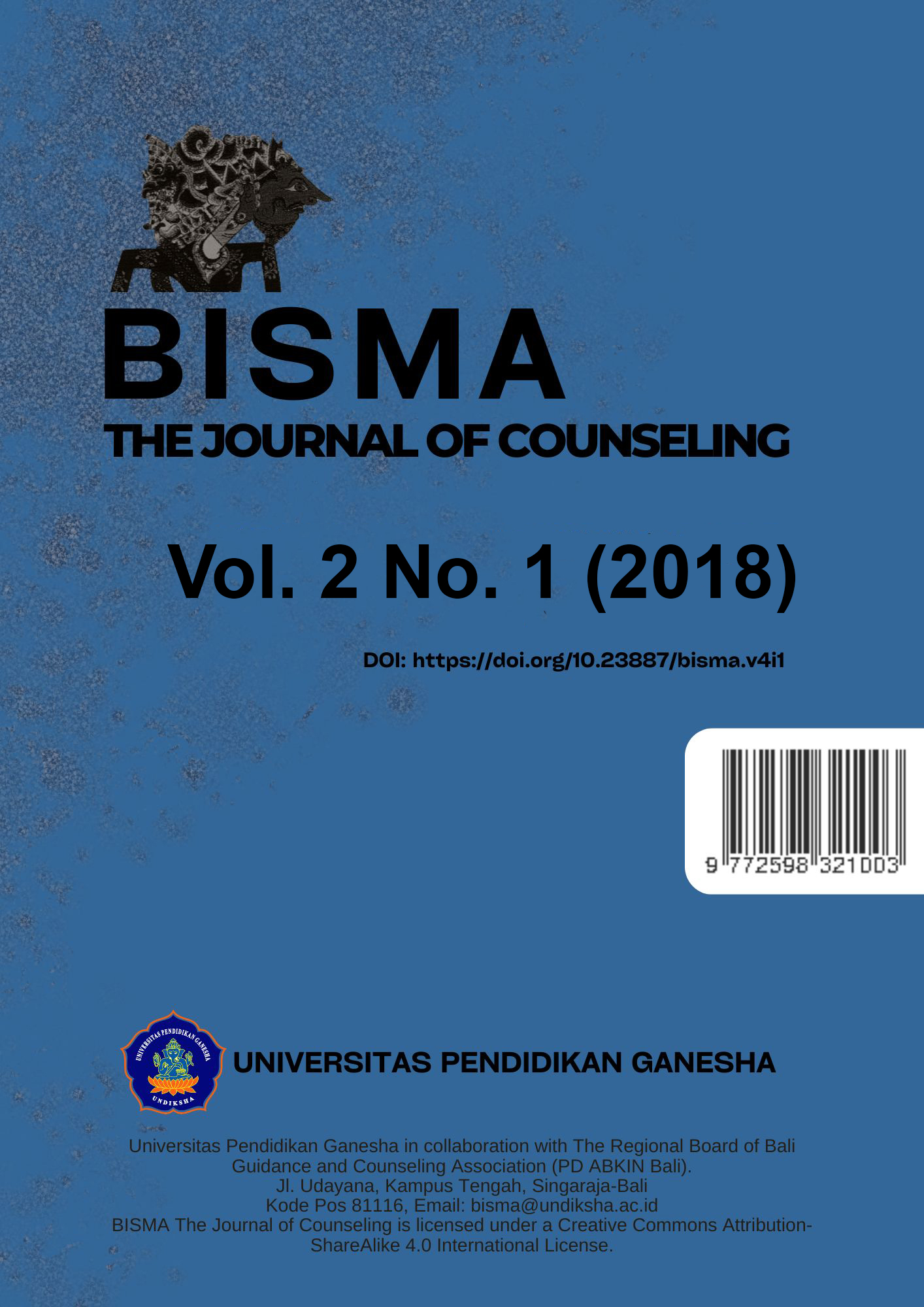Konseling Kognitif Dengan Teknik Reframing Pikiran Untuk Meningkatkan Self-Intraception
DOI:
https://doi.org/10.23887/bisma.v2i1.20001Keywords:
Cognitive counseling, mind reframing techniques, self IntraceptionAbstract
This study aims to determine the effectiveness of cognitive counseling techniques reframing the mind to improve the self-intraception of high school students Lab. Undiksha Singaraja. The population of this study is all students of class XI SMA Lab.Undiksha. The sample of this research is determined by purposive sampling technique with 7 student. Methods of data collection in research using interview method, diary, and questionnaire self intraception pattern likert scale. Data analysis method for hypothesis test using t-test. The results of this study indicate that cognitive counseling techniques reframing the mind effectively to increase the intraception of students of class XI SMA Lab.Undiksha.References
Agustin, M. (2014). Hakikat Bimbingan dan Konseling untuk Anak Usia Dini. Modul, 1, 1–31. Retrieved from http://repository.ut.ac.id/4716/1/PAUD4406-M1.pdf
Argon, T., & Ertürk, R. (2013). İlk öğretim Okulu Öğ retmenlerinin İçsel Motivasyonları ve Örgütsel Kimliğe Yönelik Algıları. Educational Administration: Theory and Practice, 19(2), 159–179.
Asih, G. Y., & Pratiwi, M. M. S. (2010). Perilaku Prososial Ditinjau Dari Empati Dan Kematangan Emosi. Jurnal Psikologi Universitas Muria Kudus, I(1), 33–42. Retrieved from http://eprints.umk.ac.id/268/1/33_-_42.PDF
Baroroh, K. (2011). Upaya Meningkatkan Nilai-Nilai Karakter Peserta Didik Melalui Penerapan Metode Role Playing. Jurnal Ekonomi & Pendidikan, 8(2), 149–163.
Bukhori, B. (2014). Dakwah Melalui Bimbingan dan Konseling Islam. KONSELING RELIGI: Jurnal Bimbingan Konseling Islam, 5(1), 1–18.
Dharsana, Ketut. 2016. Modul Teori-Teori Konseling. Singaraja: Jurusan Bimbingan Konseling, FIP UNDIKSHA.
Dwiyani, A. (2013). Perancangan Sistem Pendukung Bimbingan Online Tugas Akhir Mahasiswa Program Studi Teknik Informatika. Jurnal Ilmiah Bimbingan Konseling, 2. Retrieved from
http://jurnal.untan.ac.id/index.php/justin/article/download/3764/3768
Felix, D., & Friederike, X. R. (2012). An IRT Analysis of Motive Questionnaires: The Unified Motive Scales.
Gunantara, Suarjana, & Riastin, N. (2014). Penerapan Model Pembelajaran Problem Based Learning Untuk Meningkatkan Kemampuan Pemecahan. Mimbar PGSD Universitas Pendidikan Ganesha, 2(1), 1–10.
Johnson, L.G., 1983. Wm. C. Brown Company Publisher, Lowa
Lamont, M., & Kennelly, M. (2012). A Qualitative Exploration of Participant Motives Among Committed Amateur Triathletes. Leisure Sciences, 34(3), 236–255. https://doi.org/10.1080/01490400.2012.669685
Nurzaman, A. (2014). Pelaksanaan Bimbingan Konseling Agama Islam Pada Orang Tua Penderita Down Syndrome Di SKH Muara Sejahtera Pondok cabe Ilir Pemulang Tangerang Selatan. Retrieved from http://jurnal.untan.ac.id/index.php/justin/article/download/3764/3768
Padmowihardjo, S. (2012). Pengertian Psikologi Belajar Mengajar dan Definisi Proses Belajar. Pengertian Psikologi Belajar Mengajar Dan Definisi Proses Belajar, 1–29. Retrieved from http://repository.ut.ac.id/4427/1/LUHT4232-M1.pdf
Rahmadita, I. (2013). Hubungan Antara Konflik Peran Ganda Dan Kerja Pada Karyawati Di Rumah Sakit Abdul Rivai-Berau, 1(1), 58–68.
Saraswati, K. A., Dantes, N., & Sulastri, M. (2013). Penerapan konseling behavioral teknik penguatan positif untuk meningkatkan keterampilan berkomunikasi antar pribadi siswa.
Safitri, L. (2009). Analisis Kinerja Ekspor Dan Impor Tembakau Indonesia Periode 2000-2009. Jurnal Ekonomi, 89–107.
Sari, M. N., Sukmawati, I., & Padang, U. N. (2015). Jurnal Konseling dan Pendidikan, 16–21.
Teppers, E., Luyckx, K., Klimstra, T. A., & Goossens, L. (2014). Loneliness and Facebook motives in adolescence: A longitudinal inquiry into directionality of effect. Journal of Adolescence, 37(5), 691–699. https://doi.org/10.1016/j.adolescence.2013.11.003
Yacat, J. A. (2010). Tungo Sa Isang Mas Mapagbuong Sikolohiya : Hamon Sa Makabagong Sikolohiyang Pilipino, 5–32.
Downloads
Published
Issue
Section
License
BISMA the Journal of Counseling is an Open Access Journal. The authors who publish the manuscript in this journal agree to the following terms:
BISMA Journal is licensed under a Creative Commons Attribution 4.0 International License. This permits anyone to copy, redistribute, remix, transmit and adapt the work provided the original work and source is appropriately cited.
This means:
BISMA The Journal of Counseling is licensed under a Creative Commons Attribution 4.0 International License.
(1) Under the CC-BY license, authors retain ownership of the copyright for their article, but authors grant others permission to use the content of publications in BISMA Journal in whole or in part provided that the original work is properly cited. Users (redistributors) of BISMA Journal are required to cite the original source, including the author's names, BISMA Journal as the initial source of publication, year of publication, volume number, issue, and Digital Object Identifier (DOI); (2) The authors are the copyright owner of the article, and the author grants the BISMA Journal held the first publication right.








